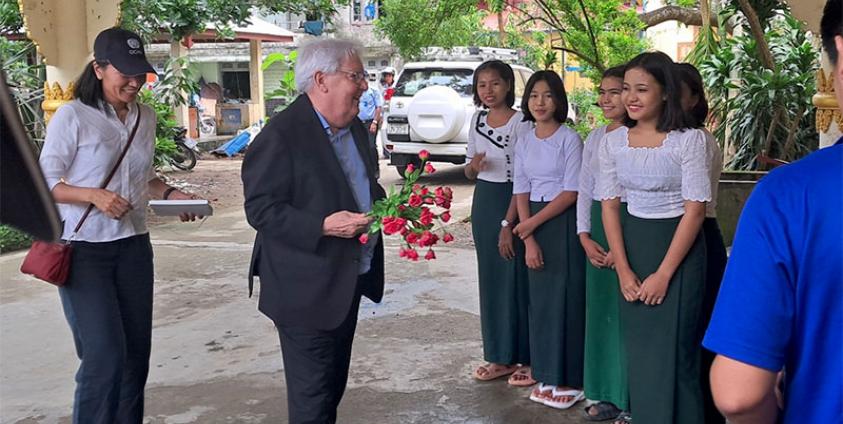On August 16, Mr. Martin Griffiths, the UN Under-Secretary General for Humanitarian Affairs and Emergency Relief Coordinator for Humanitarian Affairs (UNOCHA), visited Sittwe Township in Rakhine State to assess the conditions of cyclone-affected people.
The background to this visit was the systematic denial of access to all international aid deliveries by the Military Junta during the recent humanitarian disaster caused by Cyclone Mocha.
After his visit Martin Griffiths called for expanded humanitarian access and increased funding to assist the 18 million people in need of aid across Myanmar. “Successive crises in Myanmar have left one third of the population in need of humanitarian aid,” Griffiths said at the end of a three-day visit to the country. “They expect more and better from their leaders and from the international community.”
After his meeting with the Chairman of the Military Council, Senior General Min Aung Hlaing and his visit to Rakhine State. In Rakhine he convened with officials from the Rakhine State Military Council, and visited Ohn Taw Gyi Muslim refugee camp in Sittwe Township a Muslim refugee camp as well as Shwe Zedi Monastery, and held discussions with the officials.
U Hla Thein, spokesperson for the State Military Council, reported that in the meeting between the UN chief and the State Military Council, the discussions revolved around humanitarian assistance for cyclone-affected people, regional stability, and the implementation of pilot projects for the repatriation of Muslim refugees from Bangladesh.However, he avoided providing further details on the matter.
That monastery ‘s chief monk Shwe Zedi Sayadaw, remarked that in the meeting between himself and the UN chief, they deliberated on the importance of the United Nations providing effective assistance in the rehabilitation of the Rakhine people.
"we were primarily focused on discussing humanitarian assistance during the meeting. I requested UN support for Cyclone Mocha victims, internally displaced persons (IDPs), and flood-affected individuals. The UN chief also inquired about conflicts involving Muslims. They indicated that if there are humanitarian challenges in this region, they would report their on-site observations to the United Nations, and strategize accordingly," shared Shwe Zedi Sayadaw U Ah Ri Ya Won Tha.
The UN officials also visited the Ohn Taw Gyi Muslim refugee camp in Sittwe Township, where they inquired about the existing conditions and the challenges being confronted by the Muslim community. "We presented them with the situation of livelihood difficulties, and the need for a citizenship card. They mentioned that they will present our views to to the United Nations," shared U Hla Kyaw, responsible for the Ohn Taw Gyi refugee camp.
At present, the Military Council has imposed travel restrictions on both international and local organizations that are providing assistance to the cyclone-affected population. Rakhine politicians view the UN chief's visit to Rakhine State and his willingness to listen to the people's voices as a positive step.
Veteran politician U Pe Than. "The ongoing imposition of restrictions on humanitarian aid activities by the Military Council must cease. It's crucial for UN leaders to pay attention to the people's voices. In practice, the assistance provided by the Military Council is inadequate. Therefore, a significant amount of international aid is essential for the rehabilitation process.”
Cyclone Mocha, which hit on May 14, caused damages totaling US$2.24 billion in Rakhine, Sagaing, Magway, Mandalay,and Chin regions, with over 70 percent of this total damage occurring in Rakhine, according to the World Bank.According to the July 21 report from The Institute for Strategy and Policy - Myanmar (ISP-Myanmar), the aid
received for the recovery of the Rakhine region accounts for just around 20 percent of estimated funds required for rehabilitation and recovery.
Many people in Rakhine State wonder whether what this visit really achieved in terms of unblocking aid?
No details of any agreement with the Junta have been revealed. And as far was we know this UN Ocha chief never addressed the failure of UN Agencies to use alternative international NGO aid channels reaching Karen, Karenni and ethnic peoples who have access to the Thai-Myanmar border.
UN agencies based in Yangon have remained deaf to the many appeals from civil society to distribute part of their aid through channels that are not regime- approved, and army-controlled.
From the perspective of more than 1.9 million Myanmar citizens desperately lacking food, medicine and shelter this high-ranking visit is not likely to do much to alleviate their plight nor improve badly-tarnished record of UN agencies working inside Myanmar.








